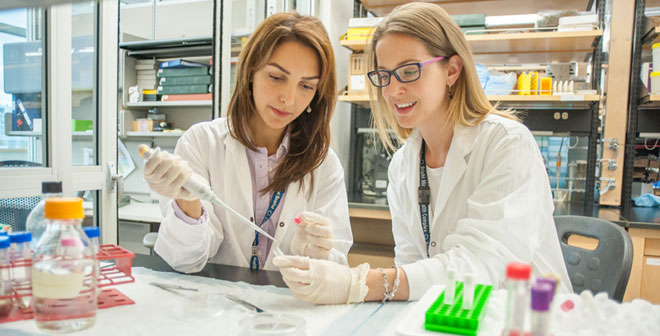Personalized medicine gets real with the Canadian Open Genetics Repository

A Mount Sinai-based database is helping share important genetic information to facilitate research and improve patient care
Imagine this scenario: A woman in Vancouver is diagnosed with cancer, with an uncommon genetic mutation. It’s not familiar to local physicians and researchers, but a quick search on the Canadian Open Genetics Repository database shows that several cases of this mutation (or variant) have been documented in Ontario – along with a detailed interpretation of the variant. A few mouse clicks saved dozens of hours of testing and analysis, and likely thousands of dollars. Most importantly, it means that the patient may be treated more quickly and effectively with a personalized medicine approach to care.
Personalized medicine (sometimes referred to as precision medicine), is an approach to clinical care that uses a patient’s unique biological markers, often genetic, to determine the best course of treatment for that individual patient. As more and more genetic information is collected, it offers real opportunities to help clinicians and researchers increase their knowledge and understanding of these markers and mutations, and ultimately change how we care for some patients. The key is to find a way to share this information and insight that is both useful and protected.
A Canadian genetics database
That is the vision for the Canadian Open Genetics Repository (COGR), based at Mount Sinai Hospital in Toronto, part of Sinai Health System, where the Advanced Molecular Diagnostics lab has been carrying out diagnostic testing for hereditary cancers for Ontario’s Ministry of Health since 2001. The COGR was launched in 2013 and has grown to include some 20 participating clinical labs and hospitals across Canada. The database allows safe and secure data sharing, ensuring patient anonymity.
Already clinicians and researchers are seeing value in this resource, which takes information from ‘bench to bedside’, translating research discoveries into patient care practices. By helping researchers and clinicians access existing information about genetic variants, the COGR can help inform and influence how we treat some health conditions.
“Researchers across Canada are making important discoveries all the time – sharing data in a consistent way means that we can build on the work of our peers and make more progress,” said Dr. Jordan Lerner-Ellis, Head of Advanced Molecular Diagnostics at Mount Sinai Hospital, who leads the COGR with Dr. Matthew Lebo, Director of Bioinformatics at Partners HealthCare Personalized Medicine in Boston.
Dr. Jordan Lerner-Ellis
“The efficiencies created by this approach could have a real impact. We’re all eager to see our efforts improve patient outcomes, but reaching that point requires greater collaboration and a simple way to share resources,” noted Dr. Lerner-Ellis. “That’s what the Canadian Open Genetics Repository is enabling.”
“For example, for many years laboratories in Canada have been carrying out genetic testing on the BRCA1 and BRCA2 genes that are implicated in hereditary breast and ovarian cancer,” said Dr. Lebo. “These labs are now poised to share this rich store of data, which could make a real difference to the Canadian and international communities.”
The COGR approach is now receiving broader attention and support. A recently published study in the Journal of Medical Genetics, a leading international peer-reviewed journal, describes the COGR and highlights the need for better standardization and data-sharing across Canada.
Contributing to a global network
While the COGR is focused on sharing results across Canada, it is part of several international networks, including the GeneInsight VariantWire network and ClinVar in the US. The COGR is also the Canadian node of the Human Variome Project.
“The vision is to someday have a huge global network that allows scientists everywhere to share and draw on each other’s findings,” said Dr. Lerner-Ellis. “An interactive, globally accessible and open genetic variant database would demonstrably benefit patients and accelerate research.”
This work was funded by the Government of Canada through Genome Canada and the Ontario Genomics Institute.






